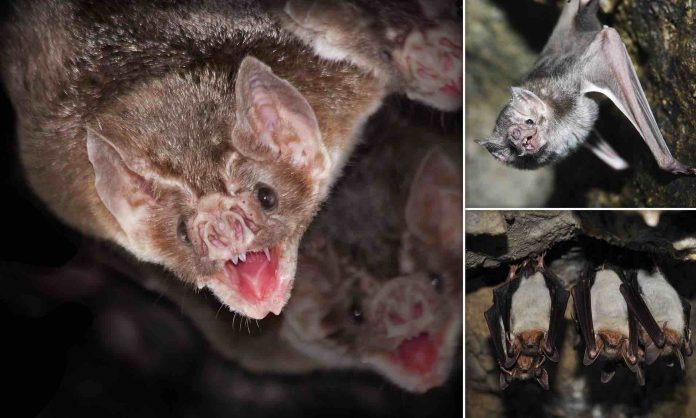PhD Student Basti Stockmaier published his last empirical dissertation chapter entitled “Immune-challenged vampire bats produce fewer contact calls” in Biology Letters. He also presented a poster today at a virtual conference entitled “How do pathogens and parasites affect behaviour?“. I’ve posted a copy of the poster below.
For obvious reasons, people are really interested right now in how social distancing affects pathogen transmission. One important part of this is how basic sickness behaviors like lethargy (which can be experimentally induced by an immune-challenge) impacts social network connectedness, which would then slow transmission. This topic was first studied in an excellent series of experiments with mice [1, 2, 3] led by Patricia Lopes (then a postdoc with Barbara König and now a professor at Chapman University).
Basti’s latest finding is quite simple. He had previously shown that sick, lethargic vampire bats don’t socially associate or interact as much with their groupmates (much like the work by Lopes). There were at least two reasons. First, the sick bats move around less and therefore encounter fewer individuals. Second, they interact less with any individuals that they do encounter (i.e. when forced together in the same space). I was convinced that the whole effect was just reduced physical activity, just on different scales. But it seemed to Basti, anecdotally from watching them, that the sick bats might also have had fewer encounters than you would expect simply from reduced movement.
Isolated vampire bats make contact calls when they hear their groupmates, and we know these calls attract specific socially bonded groupmates. Basti could not hear these calls in the video footage, so we could not tell if or how often they were calling in his previous studies, but Basti suspected that sick female bats were also less likely to “call over” other female bats using contact calls, which would mean they would be encountered less often, even independent of their movement. So Basti tested his hypothesis experimentally and found that it’s true. It makes total sense. Lopes had shown that female mice avoid the vocalizations of immune-challenged males in preference for healthy males. Basti didn’t find that the calls changed dramatically in structure, just that the bats made fewer of them.
I’ve learned that people are really interested in the personal story ‘behind the science’ so here’s mine…
I first met Basti (short for Sebastian) when I was a postdoc at the Smithsonian Tropical Research Institute. Basti had just started a PhD with Dan Bolnick. We met at a social event because we were both confused about how to start a charcoal grill. Later, he approached me with a project idea regarding “my” captive colony of vampire bats. He wanted to inject them with an immune-challenge agent and test how it would change their social behavior, explaining that such effects could have important impacts on pathogen transmission in the wild.
At first, I was quite hesitant about this invasive experiment, but when he explained his ideas, I thought they were really interesting. Basti was persistent, saying he said he would make sure his experiments didn’t interfere with our other projects and he would do much of animal care and maintenance for both his experiments and mine. So I agreed to let him do some preliminary trials…
I was very glad I agreed to this collaboration! Not only did Basti carry out his experiments with surprising independence and autonomy, but it was always fun and intellectually stimulating talking with him about this topic, which was all new to me. We had lots of dry-erase board sessions. One person in our lab commented to me that “You guys often sound like you’re arguing or fighting, but then I look over and you’re both smiling and laughing.”
For me, working with Basti was significant because it felt a bit like a trial run for what it might be like to be a mentor for a PhD student (even though his real advisors were Dan Bolnick and Rachel Page). I think working with undergrads and graduate students is something every postdoc should seek out if they aren’t doing that already. At the Smithsonian Tropical Research Institute, I was working with a team of student interns (“Team Vampire”), but most were undergraduates (and Jana was a high school student). They all had independent projects, but I would basically say “Ok, here’s your project, here’s what you should do, and here’s what you need to figure out.” In sharp contrast, Basti was the first person to join our “team” who had previous research experience, and was designing his own experiments. I assume he was learning something from me, but I was definitely learning a lot of new science from working with him. I was also learning that I didn’t need to micro-manage and control every aspect of the research (I’m still learning the right balance). So from my own point of view, this collaboration with Basti was also important for my own “career development”.
A general lesson I would draw from this is that it’s extremely educational to have close collaborations with people who are both slightly ahead of you and behind you in their careers. If you’re a postdoc, talk to starting professors, but also be a mentor for graduate students. If you’re a graduate student, get to know the older graduate students and postdocs in your lab or that are working on related fields, and be a mentor for undergraduates. If you’re an undergraduate and you want to get research experience, reach out to professors, but also, get to know their graduate students (they have a better memory of what it’s like to be your age). I want to say more on this topic of mentorship, but I’ll leave that for a future blogpost.





























